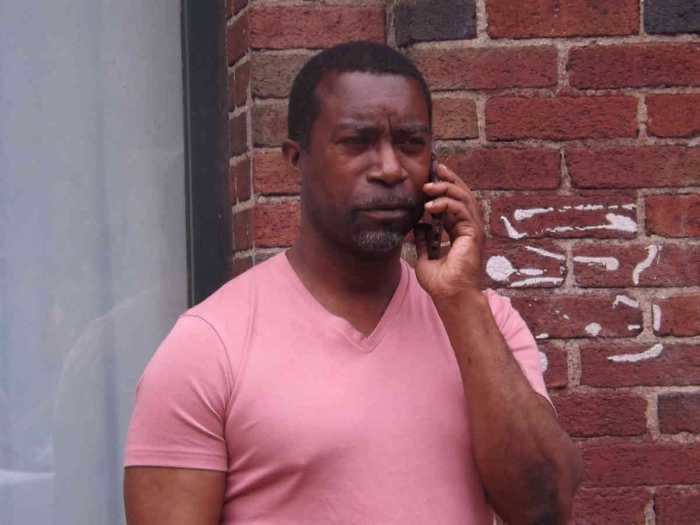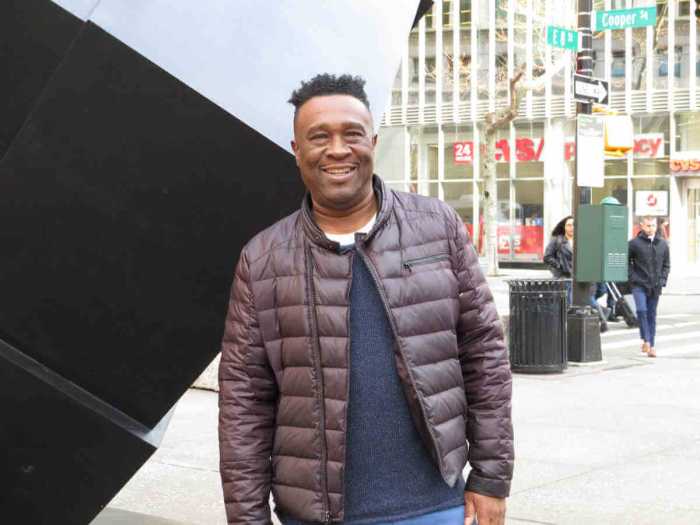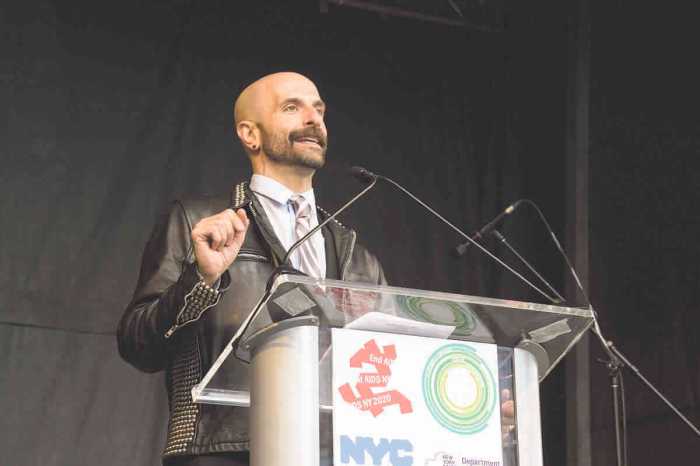Charles King (left), the Housing Works CEO, at the December 1 dedication of the NYC AIDS Memorial, with Joey Pressley, deputy chief of staff to City Council Speaker Melissa Mark-Viverito. | DONNA ACETO
While not minimizing the threat that a Trump presidency and continued Republican control of Congress pose to progressive causes, including AIDS funding, a leading HIV activist is arguing that Republicans will face serious obstacles if they attempt to enact their most extreme proposals.
“The less rabid Republicans are saying, ‘Baby steps, baby steps, we need to do this in a bipartisan way,’” said Charles King, the chief executive at Housing Works, an AIDS services organization.
Republican Paul Ryan, the speaker of the House, has vowed to privatize Medicare, the government health plan for those over 65 and for some disabled people, including some with AIDS; to turn Medicaid funding, which delivers healthcare to many people with AIDS, into block grants given to the states for them to spend; and to convert Social Security into private accounts. Some people with AIDS are supported by Social Security disability funding.
More upbeat than others, longtime AIDS warrior sees programs’ popularity as safeguard
Ryan and many House Republicans want to repeal Obamacare, which currently supplies health insurance to an estimated 18 million Americans. They are also hostile to discretionary federal spending, which includes the Ryan White CARE Act, a federal law that funds many AIDS services, the Housing Opportunities for Persons with AIDS (HOPWA) program, and the federal Centers for Disease Control and Prevention (CDC), which pays for HIV prevention efforts.
It is not only services for people with HIV and AIDS that are at risk. Many of these federal programs are contributing to components of the Plan to End AIDS, an ambitious effort that aims to cut new HIV infections in New York to 750 by 2020 from the estimated 2,481 new HIV infections in 2014. King is credited with conceiving of the plan, along with Mark Harrington, the chief executive of the Treatment Action Group, a policy organization.
One obstacle to Republican ambitions is politics. Medicare and Social Security remain very popular with many Americans, and the groups that protect these programs, such as the AARP, are very good at mobilizing their members. Every House member is up for reelection in 2018. In the Senate, 25 Democrats and eight Republicans will face reelection in two years. Generally, the party that holds the White House loses seats in Congress in midterm elections, and members on both sides of the aisle may be reluctant to cast unpopular votes.
Another obstacle is money. Thirty states and the District of Columbia have expanded their Medicaid programs under the provisions of Obamacare and they may object to unwinding those efforts. Medicare and Medicaid fund doctors, hospitals, clinics, and a host of services in every state while Ryan White, HOPWA, and CDC dollars are well distributed among the states. In King’s view, this is akin to defense funds or highway trust fund money being spent in every Congressional district, which creates a natural constituency that wants to continue to spend that money.
“There’s a reason why military procurement is spread out in all 50 states,” King said. “There’s a reason why highway funds are spent in all 50 states.”
This assumes that Republicans are rational and not driven by an ideology that opposes most types of federal spending and seeks to eliminate federal involvement in all sorts of services. King’s view is the exception and, judging by what is expressed in recent New York City town hall meetings and on social media, most people appear to be assuming the worst.
“I think it’s going to be far, far worse than anyone is even contemplating,” said Corey Johnson, the out gay city councilmember who was instrumental in getting a major component of the Plan to End AIDS enacted in the City Council. “The only hope that we have is that, potentially, Chuck Schumer, given that he’s the Senate minority leader, will have some influence is trying to stave off cuts… I think we’re going to see significant losses in federal dollars on many fronts.”
On January 3, when the 115th Congress first meets, Republicans will have 51 seats in the Senate and Democrats will have 48, with an open Louisiana seat to be decided in a December 10 runoff. Representative Nancy Pelosi’s minority Democrats in the House of Representatives lack the filibuster threat that empowers Schumer and his colleagues in the Senate.
The Plan to End AIDS, with its reliance on at least some federal cash, could face challenges. Part of the plan is implemented through the city health department’s HIV prevention and treatment program. Ryan White and HOPWA funds accounted for $183.7 million, or 94 percent, of that program’s $194.7 budget in the city’s 2016 fiscal year, which ended on June 30, according to an analysis from Scott Stringer, the city’s comptroller. Other plan elements, such as expanding services at the city’s HIV/AIDS Services Administration to people who are HIV-positive, but do not have advanced disease, use some federal dollars.
Mayor Bill de Blasio and Governor Andrew Cuomo are committed to reaching the goal of 750 new HIV infections statewide in 2020. While the city is spending some of its own money on parts of the plan, the Cuomo administration has been tight-fisted and is kicking in very little. The Cuomo administration is currently asking the federal government for $45 million for the plan to match dollars it has saved in Medicaid, which is jointly funded by state and federal governments.
“I think it’s going to take some time to see how it’s going to unfold and there will be opportunities for us to fight bad things,” King said. “I don’t want to sound Pollyannish… We’re geared up to organize and spend time fighting.”



































